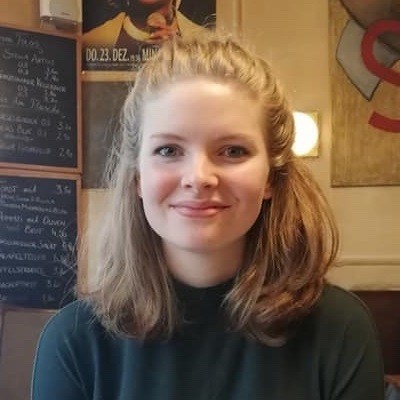
Lillian Johnson
Fiction
Lillian Johnson is an emerging writer and Literature graduate with a BA from the University of Exeter. Her story “Retainer on a Bedside Table” was published in Exeter University’s literary journal, Hiraeth. She was born in Sydney and is based in London.
Borderlands
At the northern tip of the United States on the scribbled border sits a library. Its red door opens onto a picturesque, picket fenced road—the kind with green lawns and flowerbeds throughout the dry season. Inside, a librarian slumps in his chair behind the welcome desk and silently nods as you walk through the door, licking a papery finger to turn a page of the book he’s reading. It’s a biography. Nobody you’ve heard of.
Between the fiction section and the crime section, six meters of faded yellow tape cuts this library exactly in half, marking the border between the small Vermont town and the neighbouring village in Quebec. A few chairs are crowded round a wobbly table nestled between these sections, and it’s here that you find yourself, bent over a book you can’t remember the name of, absorbed in the quiet commotions between these shelves.
When the travel ban fell like a grim cartoon anvil between families on opposite sides of the border, whispers about this library travelled from town to town, translated between many languages by people looking over their shoulders. A sign pinned to the community pinboard states in capital letters, “NO FAMILY MEETINGS.” Officers from a neighbouring town made them put it up.
Today, a tall girl with her back to the sign sits in the far corner, bent over a Stephen King novel. You watch her read and reread the first paragraph, looking up every few seconds and making small adjustments to her headscarf, absorbed in her attempt to portray absorption.
The door opens and you hear the librarian greeting someone.
“Is it okay?” they ask.
“Yes—it’s quite usual.” He whispers back in reassurance.
Their brief exchange is abruptly, but politely, halted. Out of your periphery you can see a man, a woman, and a young boy. They all have luggage. Once the little boy sees the tall girl who is stooped over the novel, the handle on his wheelie case drops to the carpet with a subdued clatter. He immediately starts to cry and runs towards the girl. He can’t be more than seven years old.
The girl stoops to envelop him and he clings to her legs. Two more pairs of muffled footsteps find their way over the yellow tape. Once the young boy has peeled himself off, leaving three wet marks on her skirt where his eyes and mouth were, the woman, who you assume is her mother, folds the girl into her arms. The girl buries her face in her mother’s shoulder, and silently judders. The library is almost silent except for the muffled in-breaths of a restrained reunion, trying to fold itself into this quiet space.
The girl buries her face in her father’s shoulder and continues to silently sob. You hear the librarian turn a page. After the embraces are done, they speak in lowered voices in a language which you think might be Persian. The girl peppers in snippets of English and her father sometimes responds in English too.
He says, “I have missed this smell.”
She responds, “You seem shorter, somehow.”
Nobody is embarrassed. There isn’t time. The girl sits between her mother and father, who each punctuate their speech by embracing her. You occasionally hear the name of a university not too far from here and conclude that she’s another student in America on a single-stay visa. She can stay here to study, but she can’t come back if she leaves. Because of the travel ban, her parents can’t come to visit. So they followed the whispers to the borderland, where you sit on the sidelines, pretending to read.
